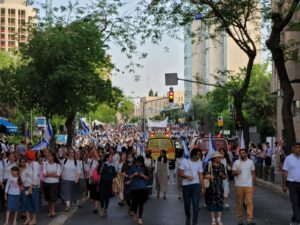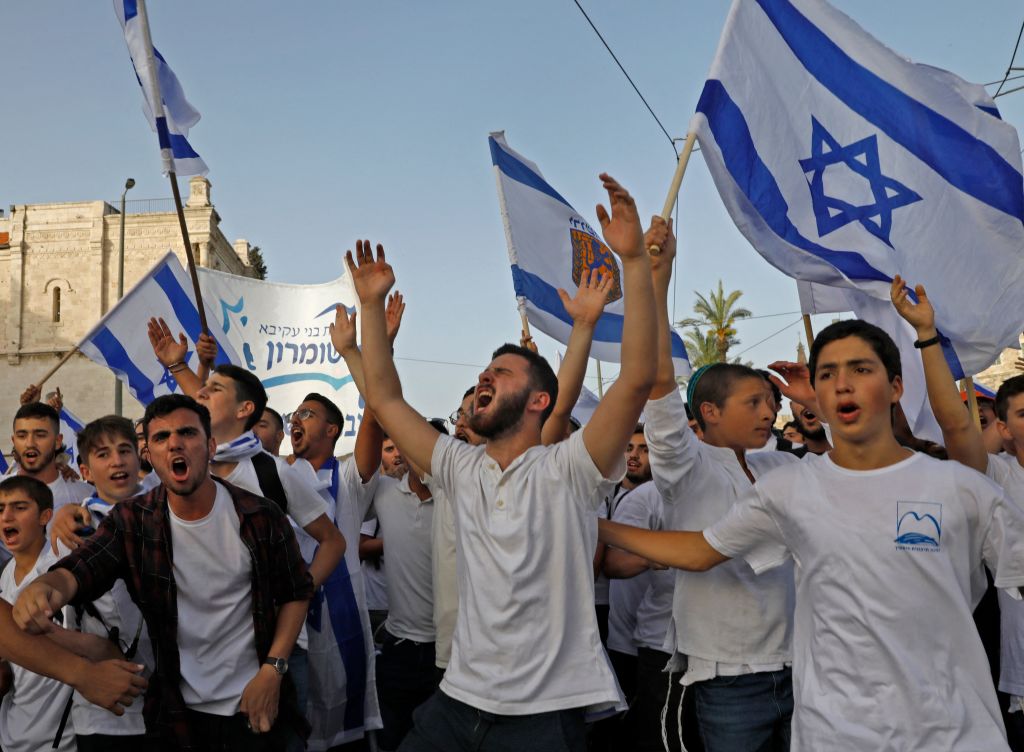Jerusalem Day Celebrated Under Barrage of Rockets
Dozens of rockets fired from Gaza on Israel as tens of thousands gather in Jerusalem to celebrate its reunification 54 years ago
Jerusalem has been burning in recent weeks, as a series of clashes between Jews and Arabs, rioters and police, has brought the city back to world headlines. As rockets fired from Gaza by Hamas landed in and around the city, Jerusalem was full of celebrators on Monday, coming to mark the extension of Israeli sovereignty over the city in its entirety, following its capture from Jordan 54 years ago.
Over 150 rockets were fired from Gaza at Israel over the course of Monday evening, with Hamas vowing a continued barrage throughout the night. At 6 p.m., Hamas fired seven rockets from Gaza at Jerusalem and its environs, sending celebrators in the streets running for cover. At least one of the rockets was intercepted by the Iron Done anti-missile defense system, while others landed in open areas. At least one home in a Jerusalem suburb was damaged by shrapnel.
During the 1967 war between Israel and its Arab neighbors, Israel conquered the neighborhoods of Jerusalem that had until then been under Jordanian rule. Importantly, this included the Old City of Jerusalem, which contains within it the Temple Mount and below it the Western Wall, Judaism’s holiest site, and the al-Aqsa Mosque, third in importance to Muslims globally.
Following the Six-Day War, Israel, through national legislation established full sovereignty over the entire city and, in 1968, the 28th day of the Jewish calendar month of Iyar was set as a day of celebration marking the connection between the Jewish nation and the city, and Jerusalem’s official reunification.
In Jerusalem’s city center on Monday, the streets were bustling with celebrators, many wearing festive white shirts and waving Israeli flags. Jerusalem resident Shlomo Zohari, out to celebrate with his family, told The Media Line that “I think that this is a deeply moving day… Jews have longed for Jerusalem for thousands of years, and to return here, to our home, to return to the Old City, to the Western Wall. It’s a dream come true.”
Zohari spoke to The Media Line before Hamas fired seven rockets from Gaza at and near the city. Following the sirens signaling a rocket attack and the muffled booms of the rockets either being intercepted or landing in open areas, the city streets again filled with people.
A young family with four children, one in a stroller, walking on a western Jerusalem street, told The Media Line that following the rocket attack police were turning people away from the Old City and the Western Wall. “We feel it is a disgrace and that it is sad they forced us to go home,” the children’s father said. Police later relented, allowing celebrations in the Old City to continue.
Yitzhak Ankona came with his family from the central city of Ramat Gan to commemorate Jerusalem Day. “It’s a special day that we mark,” he told The Media Line, prior to the rocket attack. “We’re celebrating the city, the freeing of the city back then, rejoicing in the city’s progress and the arrival of Jews to the city on this day.”
Jerusalem is at the heart of Jewish religious and national sentiment, and for millennia has been central to Jewish group identity. Events commemorating its destruction, along with the Jewish Temple that was at its heart, continue to be marked in days of mourning. Its revival and rebuilding, on the other hand, is at the heart of Jewish prayers.
Both Zohari and Ankona say that the recent escalation has strengthened their desire and resolve to celebrate Jerusalem Day. “I don’t think that violence and force will manage to drive us away from the city and ruin our happiness on this day,” Ankona said.
Israel’s decision to make the entire city its capital is internationally controversial, and Jerusalem Day itself is a matter of controversy within Israeli society. While some see it as a day of joy marking the reunification of the ancient Jewish center under Jewish law, others criticize the celebrations as an unnecessary provocation against Palestinians. It is also tied to Israel’s territorial gains in the 1967 war, a key point of contention between the Israeli right and left.

A street in Jerusalem is full minutes after a Gaza rocket attack on the city on May 10, 2021. (Daniel Sonnenfeld/The Media Line)
Dr. Hagai Agmon-Snir, former director of The Jerusalem Intercultural Center, told The Media Line that “the date was set according to the day in which Jerusalem became a unified city under Israeli rule, during the Six Day War. Now, it depends on your politics – if that event gladdens you or not.”
Palestinians see Jerusalem as their capital as well, and plans for a two-state solution have traditionally placed the Palestinian capital in east Jerusalem. Jerusalem Day contradicts that vision, having at its core the Jewish aspiration for a unified Jerusalem as Israel’s “eternal capital,” a part of the realization of Jewish return to their homeland.
“Naturally, those that feel that they are under occupation – celebrating the day in which they came under occupation doesn’t work for them,” Agmon-Snir said, referring to the feelings of Palestinian Jerusalemites toward the day. Celebrating the city’s reunification may have attracted a wider audience from the city’s different sectors, but tying it to this specific date limits its acceptance, he added.
Jews have longed for Jerusalem for thousands of years, and to return here, to our home, to return to the Old City, to the Western Wall. It’s a dream come true.
The day is marked by a series of events connected with the city. Its centerpiece is the Flag March, which starts in downtown Jerusalem, passes through the Old City, and ends at the Western Wall. This central component is the cause of some controversy. Since its path leads it through Arab neighborhoods in the city, and march participants have in the past shouted racist slogans at the Arab residents, the parade has been criticized as an act of provocation. Supporters of the parade, though, see its passage through the city’s different neighborhoods as a mark of true unification and sovereignty.
While Jerusalem has suffered in recent weeks from an increase in friction and violence after a period of quiet, Agmon-Snir points out that many times the city is influenced by outside voices. With the city’s importance to Jews, Israelis, Palestinians and Muslims, “you have a million people living in Jerusalem and sustaining ricochets coming from a billion or two billion people that don’t live here but interfere with what goes on in the city,” he said.
Tolerance within the city between the different sectors has been constantly on the rise in the last two decades, Agmon-Snir says, adding: “Yes, I am optimistic.”


